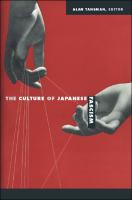The Culture of Japanese Fascism
Contributor(s)
Tansman, Alan (editor)
Collection
Knowledge Unlatched (KU)Number
105141Language
EnglishAbstract
This bold collection of essays demonstrates the necessity of understanding fascism in cultural terms rather than only or even primarily in terms of political structures and events. Contributors from history, literature, film, art history, and anthropology describe a culture of fascism in Japan in the decades preceding the end of the Asia-Pacific War. In so doing, they challenge past scholarship, which has generally rejected descriptions of pre-1945 Japan as fascist. The contributors explain how a fascist ideology was diffused throughout Japanese culture via literature, popular culture, film, design, and everyday discourse. Alan Tansman’s introduction places the essays in historical context and situates them in relation to previous scholarly inquiries into the existence of fascism in Japan.
Several contributors examine how fascism was understood in the 1930s by, for example, influential theorists, an antifascist literary group, and leading intellectuals responding to capitalist modernization. Others explore the idea that fascism’s solution to alienation and exploitation lay in efforts to beautify work, the workplace, and everyday life. Still others analyze the realization of and limits to fascist aesthetics in film, memorial design, architecture, animal imagery, a military museum, and a national exposition. Contributors also assess both manifestations of and resistance to fascist ideology in the work of renowned authors including the Nobel-prize-winning novelist and short-story writer Kawabata Yasunari and the mystery writers Edogawa Ranpo and Hamao Shirō. In the work of these final two, the tropes of sexual perversity and paranoia open a new perspective on fascist culture. This volume makes Japanese fascism available as a critical point of comparison for scholars of fascism worldwide. The concluding essay models such work by comparing Spanish and Japanese fascisms.
Contributors. Noriko Aso, Michael Baskett, Kim Brandt, Nina Cornyetz, Kevin M. Doak, James Dorsey, Aaron Gerow, Harry Harootunian, Marilyn Ivy, Angus Lockyer, Jim Reichert, Jonathan Reynolds, Ellen Schattschneider, Aaron Skabelund, Akiko Takenaka, Alan Tansman, Richard Torrance, Keith Vincent, Alejandro Yarza
Keywords
Political Science; Political Ideologies; Fascism & Totalitarianism; History; Asia; Japan; History; Modern; 20th CenturyDOI
https://doi.org/10.1215/9780822390701ISBN
9781478090885Publisher
Duke University PressPublisher website
https://www.dukeupress.edu/Publication date and place
2009Grantor
Imprint
Duke University PressClassification
Political structures: totalitarianism and dictatorship
Asian history
General and world history


 Download
Download